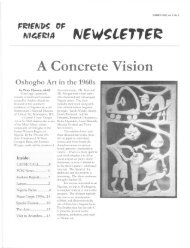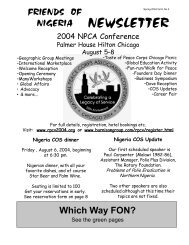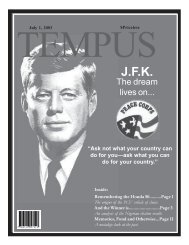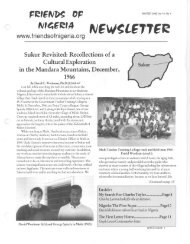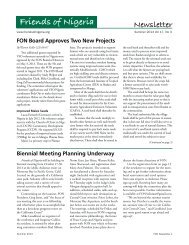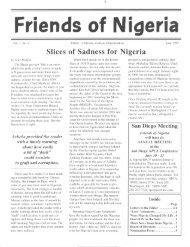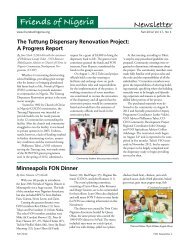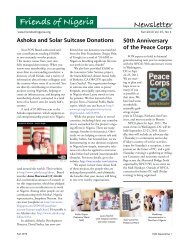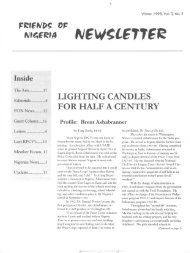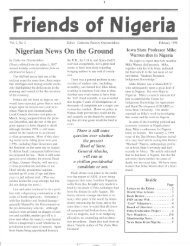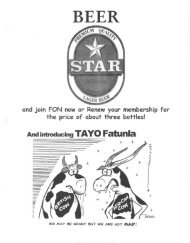FON news Spring '13.pdf - Friends of Nigeria
FON news Spring '13.pdf - Friends of Nigeria
FON news Spring '13.pdf - Friends of Nigeria
Create successful ePaper yourself
Turn your PDF publications into a flip-book with our unique Google optimized e-Paper software.
RecollectionsThe Coming <strong>of</strong> the War:My Recollection <strong>of</strong> the Beginning <strong>of</strong> the War in Biafra.Kathleen Whitney (<strong>Nigeria</strong> 15) 65-67I very much appreciated StephenVincent’s account <strong>of</strong> his experience <strong>of</strong> thegathering storm in what briefly becameBiafra. It has inspired me to tell my ownversion. I, like Stephen, was in <strong>Nigeria</strong>15, and also served in what was then theEastern Region.Kathleen Whitney, then.I taught French (among other things)at Rosary High School in the town <strong>of</strong>Awgu. The school was run by Irish nunsfrom County Cork. They (or probablytheir predecessors) had had the schoolbuilt half way up a very steep hill. Thiswas inconvenient for those <strong>of</strong> us on foot,but it commanded a fabulous view <strong>of</strong> avast plain, dotted with palm trees andsmoke from small cooking fires. Peopleused to say that on a clear day you couldsee Mount Cameroun. Stephen came tovisit me once and remarked that Awguwas like the Loire Valley <strong>of</strong> <strong>Nigeria</strong>!The first coup occurred in early January,1966, four months after we arrived.The Sardauna <strong>of</strong> Sokato, Sir AhmaduBello; the Prime Minister <strong>of</strong> <strong>Nigeria</strong>,Sir Tafawa Balewa; the Premier <strong>of</strong> theWestern Region, Chief Ladoke Akintola;and the Finance Minister, Chief FestusOkotie Eboh (among others includingmilitary <strong>of</strong>ficers) were killed in theprocess, presumably by Igbo and Yorubaarmy <strong>of</strong>ficers. The new head <strong>of</strong> thegovernment was Major General Aguiyi-Ironsi. He and most <strong>of</strong> the army leaderswere Igbos.The following spring, in retaliation,the Hausas in the North began murderinghundreds and thousands <strong>of</strong> Igboswho were living in the North. Thousandsmore Igbos began fleeing back to theEastern Region, leaving jobs, houses andschools. Trainloads <strong>of</strong> bodies <strong>of</strong> Igbopeople came down to the East. I wascoming back from Onitsha one day soonafter the coup, and police (or soldiers —I didn’t quite know) were stopping carsall along the way. The nuns at my schoolwere all ready to pack up because theysaid the Moslems wouldn’t want all thoseCatholics around. Mother Thecla saidto me, “so you may be running RosaryHigh School next month.” I said I’dquickly convert.The killing <strong>of</strong> Igbos in the Northcontinued throughout the summer. Hereare some excerpts from letters I wrotehome:Sept. 12, 1966John E., stationed in the North, sayshe has to step over bodies in the street <strong>of</strong>his town (Ibo bodies), and isn’t allowedto help wounded or anything. Othervolunteers in the North are hiding Igbosin their houses and sneaking them to theborder.Sept 28, 1966On Saturday I was in Enugu. As Iwas passing the market at about 11 am, Isaw a crowd <strong>of</strong> men yelling and apparentlychasing someone. I asked the taxidriver what was happening. He explainedto me, in an uninterested tone <strong>of</strong> voice,that it was only a Hausa person thatthey wanted to kill, but that he escapedin a car. Later, in another part <strong>of</strong> town,in another taxi, I saw a similar crowdbut this time there were also policemen,armed with wicker shields….The nextday I was told that some Hausas andIgbos had been killed in the market.That evening, several <strong>of</strong> us PC volunteerswere at Mary’s house. At about 10 pmsomeone remarked that there was fire inthe sky. Because <strong>of</strong> what had happenedduring the day, we immediately thoughtthat this might be an act <strong>of</strong> aggressionagainst some Hausas, and especiallybecause the Hausas who sell beef (whichcomes from the North) live in little hutsvery near where we were staying. Wewent down into the street to see whatwas happening. It was as we thought: Igboswere setting fire, in a very organizedway, to the Hausas’ huts. Apparently theHausas who lived there had already left,but it occurred to me that it would bevery difficult at this point to return tothe North. All the truck drivers, trainengineers etc are Igbos, and in fact trainshave had to stop running. At this point,Hausas who are here in the East can’tgo north and Igbos in the North can’tcome back to the East. Communicationhas halted. After seeing all that, we thensaw two policemen who were walkingvery near the fires, seemingly without theleast intention <strong>of</strong> intervening. The mostbizarre thing about this whole affair wasthat there was absolutely no panic orhysteria and most people didn’t seem tocare at all.Oct. 6, 1966…War seems to be imminent. …British are blamed for egging the Hausason with this mass killing <strong>of</strong> Igbos, sincethe Igbos are in competition for skilledjobs in the North…Last weekend waspretty awful. Apparently 1400 Igboswere killed in Jos or Kano or somewhere,and all over the East, people have begunretaliating and killing Hausas. Of course,there are less Hausas to kill here. Twentyfivein Port Harcourt seemed to be themost in any one city, but it’s still terrible.I travelled south to Owerri. EverywhereI went there was violence. It was kind <strong>of</strong>scary. Alan and I were waiting for a rideoutside <strong>of</strong> Onitsha Monday morning andwhile we were standing there a man gotstoned to death. We didn’t actually seehim die. We saw him being stoned, andget bloody and his clothes torn <strong>of</strong>f, andmen with big sticks and rocks pursu-(Continued on next page)10 <strong>FON</strong> Newsletter <strong>Spring</strong> 2013



